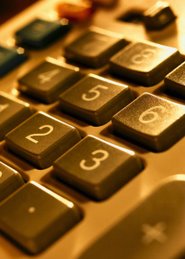First, you start to keep a record of what groceries and other related kitchen items (dishwashing detergent, papertowels, cleansers, etc.) cost. You do this by entering the product name (including brand), when and where you bought it, and then you break down the cost by unit. For instance, if you buy a 3.5 ounce can of tuna fish, you get out the calculator and you figure out what it costs you per ounce.
You keep this book religiously. I used a spiral-bound notebook but I suppose you could do it on a legal pad or computer. You start out recording everything you buy. You group things as best you can so you can find items easily.
Pretty soon you have a baseline. You know the going rate of an ounce of tuna fish, a pound of flour, an ounce of coffee, and the price of a tea bag.
After that, every time you go shopping, you bring the price log with you so you can tell what's a deal and what isn't. The results may surprise you. Some common myths that this book has dispelled are the "always" myths:
- It's always cheaper to buy the bigger size (no, not always)
- It's always cheaper at the discount or big-box store (no, not always)
- It's always cheaper with coupons (no, not always)
It takes a month or so to get a good baseline working but once you have it, you will find this addicting.
Now you begin to pantry shop. The goal with pantry shopping is to buy things when they are a great deal, not when you need them. The only way you can do this is to get free of the tyranny of "needing" to buy food. So you stock up. That's the pantry part.
It may take a few months to get there, but you will get there if you persist. Here's how you start. Let's say peanut butter (a favorite in your family) goes on sale. Don't just buy one. Don't even buy two. Peanut butter keeps a good long time and if your family loves it, buy a bunch. Buy six or ten. Then put them in your pantry.
When you cook, you cook out of the pantry. When you shop, you're scoping out the bargains. Don't buy peanut butter gain until you can meet or beat that super-good deal.
It helps to get a freezer. Let's say chicken goes on sale. Buy cheap chicken, pack it up in portions as you would use it for a meal, and stash it in the freezer. Now you no longer have to run out and buy chicken because you need it. You won't need it; you have a stash. You replenish that stash when you find another good deal.
If you do this for a while, you will consistently be eating the bargains: the bargain-priced tuna, the cheap chicken, the sale-of-the-century peanut butter.
What about produce? A true tightwad will grow a lot of her own, but that's another article. But the fact is pantry shopping does not work for perishables like fruit, vegetables, milk, and dairy products. You have to buy those as you use them.
It's more of a change in mindset than anything else: you're shopping for the pantry and to beat the baseline.
A couple of drawbacks. This is not a beginner's strategy! You need to be fairly relentless and dedicated to pull this off. You also need some room in your house for your pantry (this is hard for people living in very cramped quarters) and the time and discipline to keep an accurate price log. You also have to be able to cook, since the strategy is ideal for people who cook from scratch.



